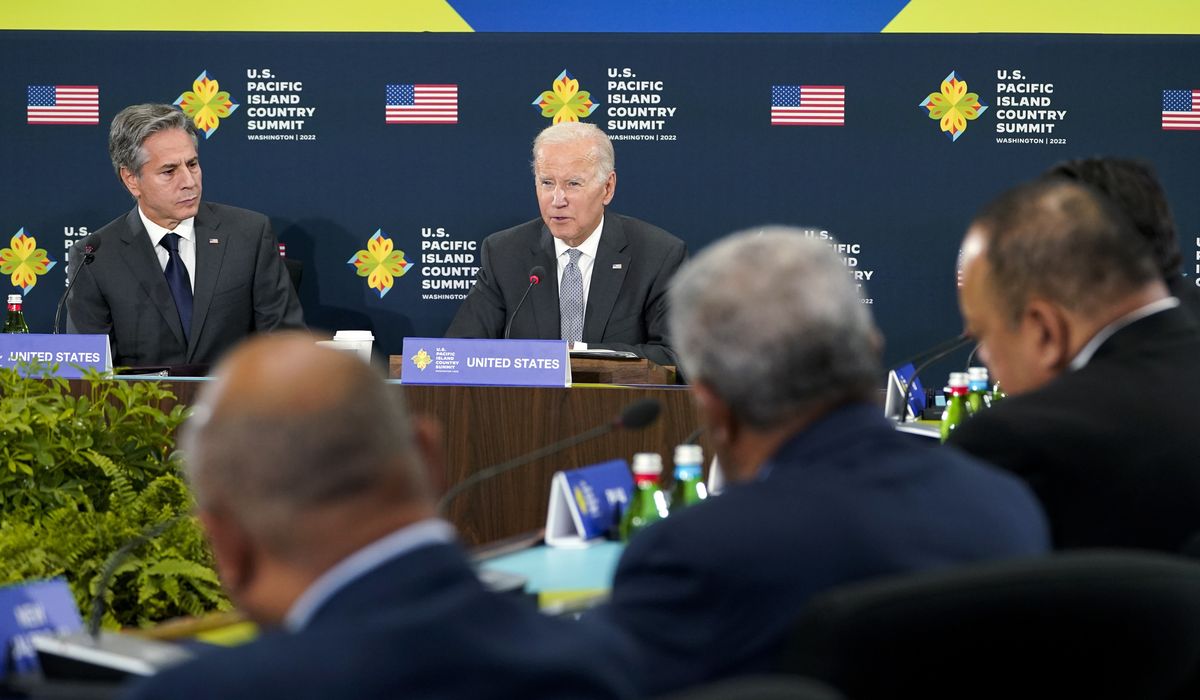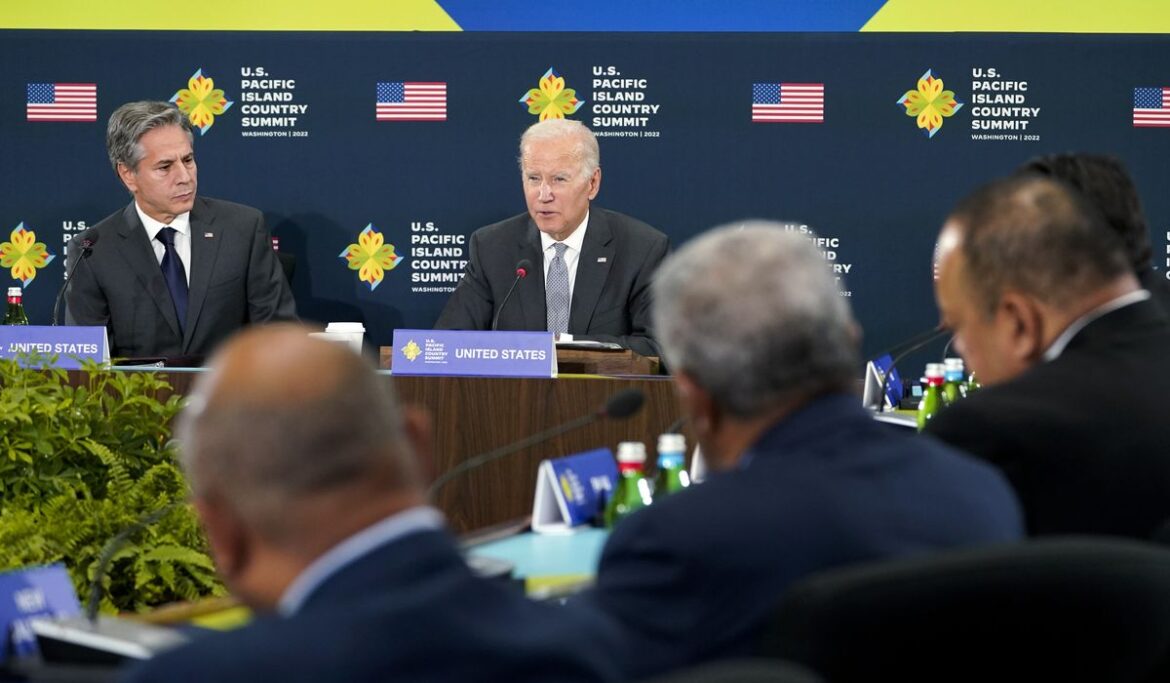
President Biden on Thursday made a pitch for greater U.S. influence in an increasingly contested region, promising leaders of a group of long overlooked island nations in the Pacific at a White House summit that they will have a “critical voice” in shaping global security “over the coming years and decades.”
Capping the first-ever U.S.-Pacific Island Country Summit, Mr. Biden pledged U.S. commitment to ensuring an Indo-Pacific “that’s free and open,” as his administration moves to counter China’s aggressive campaign to win friends, markets and security partners in the South Pacific.
“A great deal of the history of our world is going to be written in the Indo-Pacific over the coming years and decades,” Mr. Biden said. “The Pacific Islands are a critical voice in shaping that future. And that’s why my administration has made it a priority to strengthen our partnership with your countries.”
Leaders from Fiji, Marshall Islands, Micronesia, Palau, Papua New Guinea, Samoa, Solomon Islands, Tonga, Tuvalu, Cook Islands, French Polynesia and New Caledonia attended the two-day summit in Washington. Vanuatu and Nauru also sent representatives.
Representatives from Australia and New Zealand attended as observers.
As part of the wooing process, Secretary of State Antony Blinken hosted a luncheon for the visiting leaders, who also attended a climate roundtable hosted by U.S. climate envoy John Kerry and a dinner with national security advisor Jake Sullivan hosted by the Coast Guard. The summiteers also met with House Speaker Nancy Pelosi, Commerce Secretary Gina Raimondo and several U.S. business leaders.
SEE ALSO: Threat of Chinese invasion is ‘real,’ Taiwan’s foreign minister says
U.S. engagement with many of the Pacific Islands represented at the summit has waned in the decades following the end of the Cold War, leaving a void that Beijing has rushed to fill.
White House officials said the summit is the product of a recognition early in the Biden administration of a need to pay more attention to small but strategic nations that had long received “short shrift” in U.S. foreign policy.
“The security of America, quite frankly, and the world depends on your security and the security of the Pacific Islands,” Mr. Biden said Thursday.
The White House on Thursday unveiled its “Pacific Partnership Strategy,” pledging to expand diplomacy in the region and bolster U.S. commitments on issues ranging from climate change to maritime security. The 16-page strategy document notes heightened geopolitical tensions in the region, including “pressure and economic coercion by the People’s Republic of China.”
The blueprint calls for more U.S. diplomatic missions in the region, as well as increasing U.S. Coast Guard, National Oceanic and Atmospheric Administration and Defense Department presence.
The White House also announces a bevy of other proposals, including $810 million in additional aid for the region and a pledge to request $600 million from Congress to fund economic assistance for Pacific island countries over the next decade.
SEE ALSO: Six states sue Biden administration over student debt relief
In line with its push to expand the U.S. diplomatic footprint in the region, the administration also announced that it plans to recognize the Cook Islands and Niue as sovereign states, pending “appropriate consultations.” Both islands are currently recognized as self-governing territories by the U.S.
The White House previously announced plans to open embassies in the Solomon Islands, Tonga and Kiribati. In addition, the president named Frankie Reed, a veteran diplomat in the region, to serve as the first-ever U.S. envoy to the Pacific Islands.
While the increased attention by the U.S. is welcomed by many of the countries, the diplomatic push has had its challenges in recent months. Earlier this month, the Marshall Islands suspended talks with the U.S. to renew its security partnership with the U.S. amid the fallout over U.S. nuclear testing on the island decades before.
In April, the Solomon Islands signed a security pact with China promising to expand trade and education cooperation.
Earlier this month the Solomon Islands signaled it would not join the other countries attending the summit in signing a joint statement declaring the U.S. partnership with the Pacific Islands that Washington had hoped to roll out during the summit.
Ambassadors from three other Pacific Island nations – Palau, the Marshall Islands and Micronesia – told the White House in a letter that the economic assistance being discussed was “insufficient.”
“The currently proposed assistance is inconsistent with the contributions of our islands toward the security and stability of the region, which also supports U.S. interests in the region,” the ambassadors wrote.
For its part, China has sharply criticized Mr. Biden’s summit and the U.S. charm offensive, predicting the summit countries will resist being forced to take sides in the superpower rivalry.
“It’s known to all that the U.S.’s sudden attention paid to the Pacific Island countries is not out of conscience,” the Chinese state-controlled Global Times wrote in an editorial Thursday. “… In recent years, the rapid development of mutually beneficial cooperation between China and Pacific Island countries has become a thorn in the side of the U.S., and [Washington] is eager to remove it.”





